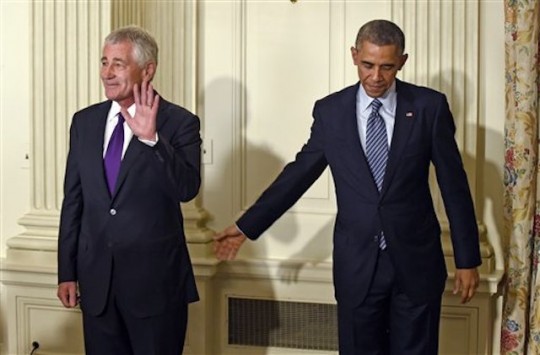On the one hand, it makes sense why the White House needed to leak so emphatically this morning that Hagel’s departure was "under pressure" and not an amicable split. First, Hagel and his people were saying that he had initiated the split over his frustrations with the White House, and the president’s aides no doubt felt that such a narrative needed a strong response.
Second, there is a roughly 100 percent chance that Hagel will publicly have unkind things to say about the White House’s foreign policy team at some point in the future. Spreading the impression that he left office under a cloud is an advance means of rebutting his inevitable criticism. And it must be conceded to the White House leakers that the criticisms they were making against Hagel—that he was out of his depth, not up to the tasks at hand, not exactly enterprising—had an air of plausibility to them. If only there had been fair warning.
On the other hand, there is a strong case to be made that Hagel served the White House admirably well. Tasked with implementing a series of policies that could only harm the military and American national security, he carried the president’s water largely without complaint. If there were moments when his sycophantism lapsed—stating publicly that the threat from the Islamic State is serious, for example—well, he is only human. It is hard to imagine that a Michèle Flournoy, reputed to be a strong and intelligent operator with her own independent will (even if wrong about many things) would be as efficient of a patsy. Or that anyone even remotely plausible for the position could achieve the sweet spot that Hagel did: The intersection of a certain sort of strong Washington reputation and remarkable weakness of character.
Without changes at the White House, including the departure of both Susan Rice and Ben Rhodes, how is any Secretary of Defense meant to solve the problems that Hagel, according to the White House, was failing at? Defeat the Islamic State in Iraq and degrade them in Syria—but with no resources. Prevent the Afghan government from falling to the Taliban—but with no resources. Signal a strong front to the Russians in Eastern Europe—but with no credible threat of force or even serious diplomatic cooperation in the form of tough sanctions.
The task of the next Secretary of Defense is not enviable. This man or woman must be prepared to implement a series of overseas military campaigns that are not designed to succeed, but rather to satisfy domestic political considerations that the president be seen to be doing something about the Islamic State, the Taliban, etc. To do so while continuing to manage the hollowing out of the force through budget cuts and the implementation of social policies that are unpopular within the military. To be prepared to be micromanaged by a White House national security shop famous for its incompetence and raw politicization. To do so while maintaining total loyalty to the president and his incompetent, micromanaging aides.
There are plenty of hacks who could do this job, but they don’t have the credentials. And as for those who have the credentials: Who would want the job?
